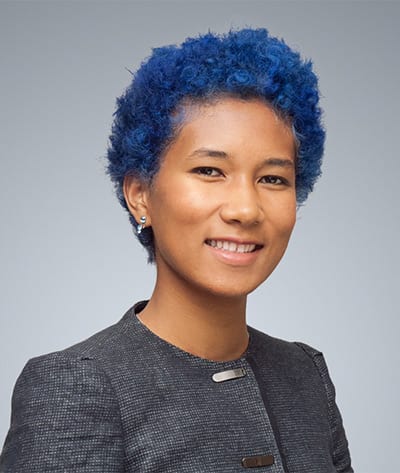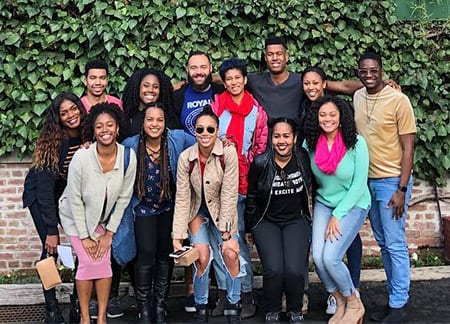By Andrew Cohen

While the archives are not definitive, Djenab Conde ’19 is believed to be the first African American woman elected editor-in-chief of the California Law Review (CLR). A momentous achievement, hardly a shock to those who know her.
“Djenab is a well-rounded and respected leader at Berkeley Law,” says Mia Akers ’18, the journal’s senior diversity editor. “She brings critical thinking and innovation to any space she’s in.”
Berkeley Law’s preeminent journal, CLR publishes six annual issues on a wide range of legal topics. Professor Amanda Tyler, for whom Conde works as a research assistant, was “not the least bit surprised” to learn of her election.
“She combines the wonderful qualities of maturity, humility, and kindness with superb intellectual firepower,” Tyler says. “Djenab also brings a unique and important perspective to the table, having lived all over the world, and a track record of working hard to promote important issues under very trying circumstances.”
Case in point: After graduating from Yale in 2015, Conde deferred her Berkeley Law admission to accept a 10-month fellowship with GlobalGirl Media in Casablanca, Morocco. The nonprofit works to empower high school age girls from underserved communities around the world through media, leadership, and journalistic training.
Just two months in, an unexpected employee departure vaulted Conde from intern to the coordinator of GlobalGirl’s fledgling Morocco program.
“It was hard to be there by myself for 10 months while dealing with internal organization issues and various external challenges,” Conde says. “We were trying to get this off the ground in a country where the government was wary of a nonprofit focused on young women and journalism. Definitely a difficult experience, but I learned and grew a lot.”
Power of perspective
The daughter of a Guinean father and Chinese mother, Conde lived in China, France, and different West African nations as a child. Her family moved to Columbus, Ohio, when she was seven, and she just spent winter break in Guinea—her first time there in 18 years.
“It was great to reconnect with family members, but also depressing because not much has changed there,” Conde says. “I feel very lucky to be in America, and at Berkeley Law, where most students’ biggest worry is how to find a fulfilling career. We don’t have to worry about electricity, running water, rampant corruption … it’s helpful to remember that, and approach things with a different perspective.”
Conde will be the sixth person of color to lead CLR over the past 15 years. She does not contend that minority voices are more valuable than others, but that having more ethnic backgrounds adds value to any enterprise.
“Whether it’s a journal, other student group, or Berkeley Law in general, more diversity can only help,” Conde says. “At CLR, what we publish should be as inclusive and intersectional as possible. You only know the experience you’ve lived, and the more different experiences and voices we have in the room the better. I was very honest about that when pursuing this position, and I’m grateful people responded well to it.”
New CLR Development Editor Anna Williams ’19 is “proud to have one of my boldest friends and colleagues at the helm. Djenab personifies so much of what is great about this law school and its flagship journal: she has a sharp mind, a keen eye, and a heart for both reason and justice. Her election is important not only because she’s our first female African American editor-in-chief, but because she’s someone who will signify, both internally and externally, CLR’s standard for excellence and progress.”
Conde recently edited an upcoming CLR article on unreasonable searches and seizures in which a survey showed how judges’ expectations of privacy do not match society’s. When she noted how this could influence decisions in close cases and suggested the authors bolster the section, they altered the text accordingly.

“My comments were largely based on my personal experience as a Black woman,” she says. “Voices like mine have been underrepresented throughout the legal profession, and it’s gratifying when people value them.”
Making her mark
Conde’s voice carries throughout Berkeley Law. She is co-president of its Law Students of African Descent (LSAD), part of its International Human Rights Law Clinic, and a member of its Women of Color Collective and Asian Pacific American Law Student Association.
“Her leadership in LSAD has pushed us to be more creative in how the organization supports Black students at Berkeley,” Akers says. “I know Djenab will bring this type of forward thinking to the editor-in-chief position and push CLR to grapple with its scholarship, outreach, and purpose in new ways.”
Last year, Conde participated in two Student-Initiated Legal Services Projects: the Juvenile Education Advocacy Project and the International Human Rights Workshop. She also was a member of the Berkeley Technology Law Journal and the Berkeley Business Law Journal.
Her achievements caught the eye of not one but two federal jurists. Less than a year into her law school career, she secured clerkships with Judge Victor Bolden (U.S. District Court, Connecticut) for 2019-20, and Judge Paul Watford (U.S. Court of Appeals, Ninth Circuit) for 2020-21.
Conde was one of 11 African American Berkeley Law students and alumni chosen for coveted federal clerkships during last year’s hiring cycle. It marked the highest number in school history and an impressive figure given the jarring lack of racial diversity within U.S. judicial chambers. African Americans held only 3 percent of federal clerkships in the most recent figures made available by the National Association for Law Placement.
“Berkeley Law’s commitment to progress is encouraging,” Conde says. “I recently spoke to someone at a top law school who was trying to be first Black editor-in-chief at the law review there. The whole journal had just three people of color, including Asians and other ethnic minorities. That was shocking to me, because it made me realize that everything is relative…but we still can and need to do better in terms of diversity.”
Tyler sees “much to celebrate in Djenab’s election,” and expects CLR to thrive under her leadership. “For her to be the first African-American woman to lead the journal makes this all the more special.”